Stefano Domenicali — My route to the top of Formula 1
Having started his career in Ferrari’s financial department, Stefano Domenicali has gone on to be a world championship-winning team boss, a spy hunter, a scapegoat, a supercar supremo and now takes on perhaps the toughest challenge of all – leading Formula 1 into a new generation. Adam Cooper meets the F1 CEO to talk about his route to the top
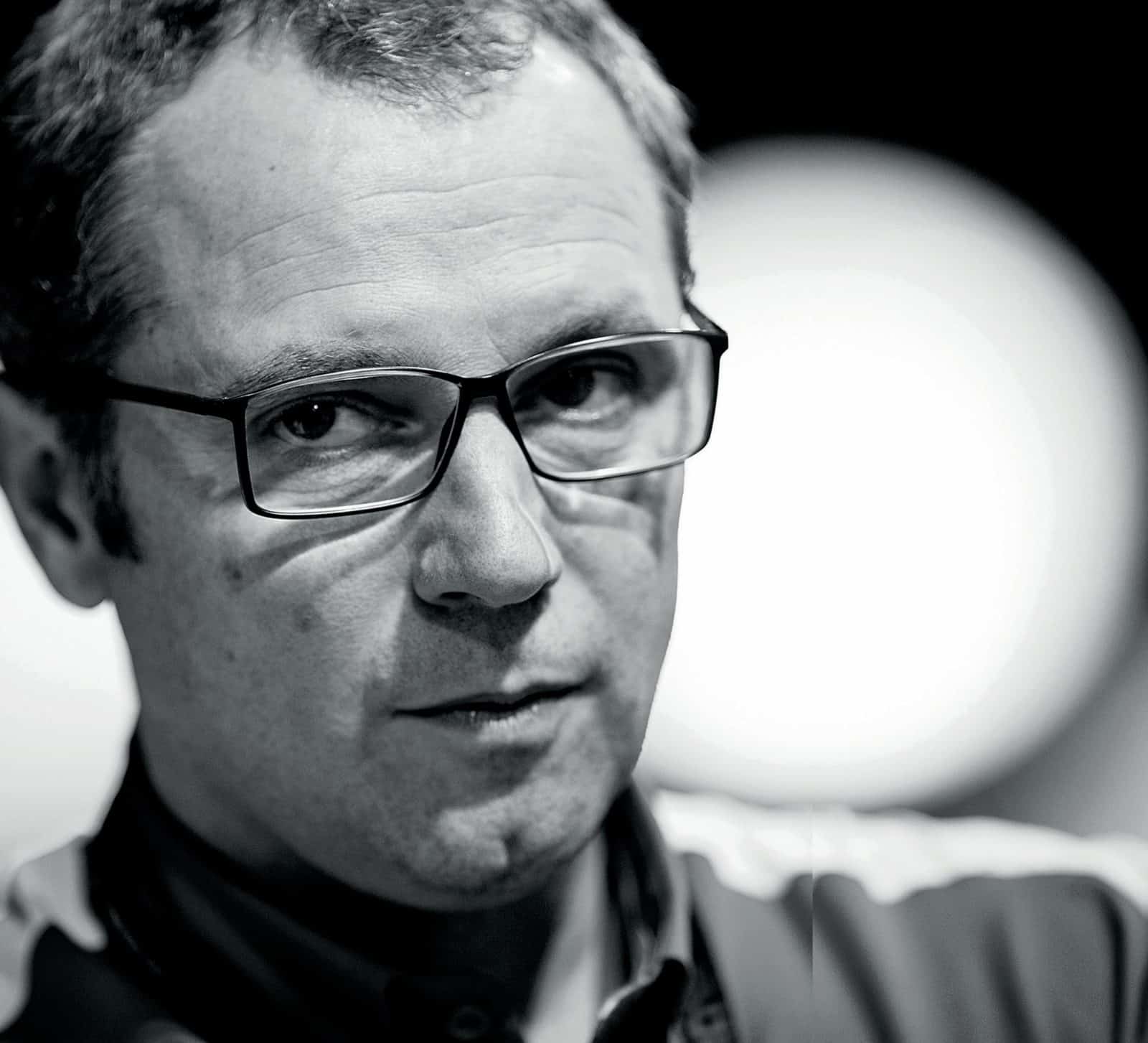
At the start of this year Stefano Domenicali joined the Formula 1 organisation as its new CEO, and is only its third ever top man after Bernie Ecclestone and Chase Carey.
The Italian brings with him an impressive CV and depth of experience gained in racing and the wider motor industry, and along the way he’s soaked up knowledge and sharpened his leadership skills.
What hasn’t changed is the upbeat personality that helped to ensure that he was a universally popular choice as successor to the efficient but dour Carey. Domenicali is a glass-half-full guy; his default setting a welcoming smile. The 56-year-old possesses a ready charm that came in very useful when as Ferrari team manager he had to resolve the latest controversy with the stewards.
At heart he remains a racing fan, one of the few senior people in the F1 world who has actually paid to watch races from trackside. So how safe is the future of the sport in his hands?
“When you’re a guy born in Imola, you were raised up with the perfume, the smell of the oil, of the fuel, and the engine sound of the bikes and the cars,” he recalls. “When I was a kid I already was in love with motor sport in general. I was attending races with the general admission at the Tosa corner with my friends, staying there all night long.
“Then when I was at college, I was helping the organisation during the racing weekends. I was actually parking the trucks, I was checking the passes inside the paddock. That’s where I met for the first time the mechanics, Mr Ecclestone and all these people.”
Determined to find himself a job in racing Domenicali – the son of a banker – opted to study business rather than a technical subject.
“It’s curious enough that neither from the driving perspective, nor the engineering perspective, was I attracted by motor sport. It was really the passion for the sporting challenge. And the organisation, the level of activity that you have to co-ordinate, is impressive. So I was always fascinated by that.”
Naturally his ambition was to work in racing, and having graduated from Bologna University and fired off his CV to companies all over Italy’s ‘motor valley’ he was accepted at Maranello in 1991.
“Early on I was working in the area I had graduated in, which was in business control, administration and fiscal, so it was something that you could do in any company in the world. Of course, the fact that it was Ferrari meant a lot. And then I had the privilege of being connected to motor sport because of Mugello.”
Working on the fringes of the F1 team Domenicali identified Ferrari’s ownership of Mugello as a way to broaden his sporting horizons. In the early 1990s he became deeply involved in the organisation of events.
“I took the licence of being race director, steward, clerk of the course. Basically I was doing my normal business during the days of the week, and then I was going to the race track. During the period I was also responsible for the shareholding structure of Mugello on behalf of Ferrari.”
What he really wanted to do was work on the front line of the racing team. After spells in human resources and sponsorship the chance came at the end of 1996, early in the Michael Schumacher era. He landed the role of team manager, later taking the title of sporting director. In effect he was Jean Todt’s right-hand man, overseeing operations at the track and serving as the link to the FIA.
“Step by step I was there. I don’t want to exaggerate, but it was really like a dream come true. And it was real.”
Working alongside Schumacher, Todt, Ross Brawn and Rory Byrne, Domenicali was a key member of the ‘dream team’ that, after a few heartaches, was destined to go on to dominate the early 2000s.
“I would say the beauty of that period was we had a very, very well integrated group of people that were in different competencies, and shared a lot of respect. It was an incredible organisation, and this period was really fantastic. Every one of us was having a role that was important in this path. That was really very, very crucial.”
Domenicali learned a lot working under Todt: “He is a leader that can motivate, he is always putting you under pressure. But he’s also giving a lot to the people he trusts and who are loyal to him, and he is very solid. He never stops working.
“This is something that I tried to do the same also on my side when I grew up in different roles. I have to say that was very important in my career.”
In 2007 Todt was promoted, leaving Domenicali as de facto team boss. It was to be a memorable season on and off track, with Kimi Räikkönen stealing the title from Lewis Hamilton and Fernando Alonso at the last round in Brazil. And it was all played out against the background of the infamous McLaren ‘Spygate’ scandal.
“We had from the sporting point of view an incredible end of the season, because if you think that with two races to go we were behind by 17 points. And we won with Kimi after an incredible race that I remember every single moment of. On the other hand, we do not have to forget that season was very crucial with regard to the spy story.”
The affair erupted when it became known that McLaren man Mike Coughlan had received Ferrari documents leaked by longtime Ferrari chief mechanic Nigel Stepney. It only came to light when a switched-on employee of a Woking-based photocopying business became suspicious.
“I was the one personally who received the email from the guy from the copy shop, because he was a Ferrari superfan. He emailed to me something that for him was strange to copy. It was an email with an unknown name for me. I was ready to delete it, and by chance I opened it and I saw a drawing of our car.
“It was a very difficult story, because it was something that we were not expecting. Without talking about the other side, someone of our team, a team that was pretty unique, did what he did. So we were shocked.”
“I personally got the Spygate email from the copy shop guy”
In 2008 Domenicali formally took over the team principal role, the first change at the top at Ferrari since 1993. It was to be another dramatic season that featured Felipe Massa missing the title by the slenderest of margins at the Interlagos finale.
“It was a year where we had the Singapore Crashgate [starring Renault], a year where we lost races we had already won… I remember Hungary – Felipe was leading easily, and then we had a failure on the engine.
“Then that last race, I would say from a TV perspective, that was a race that people will forever remember – for Felipe to be a world champion for 20 seconds or something like that, then Lewis winning his first title. It was an incredible season.”
The constructors’ title at least provided some compensation from the year, but there was more frustration to come for Ferrari. In both 2010 and 2012 Fernando Alonso narrowly lost out to Red Bull’s Sebastian Vettel, in the first year thanks to a strategic clanger at the Abu Dhabi finale.
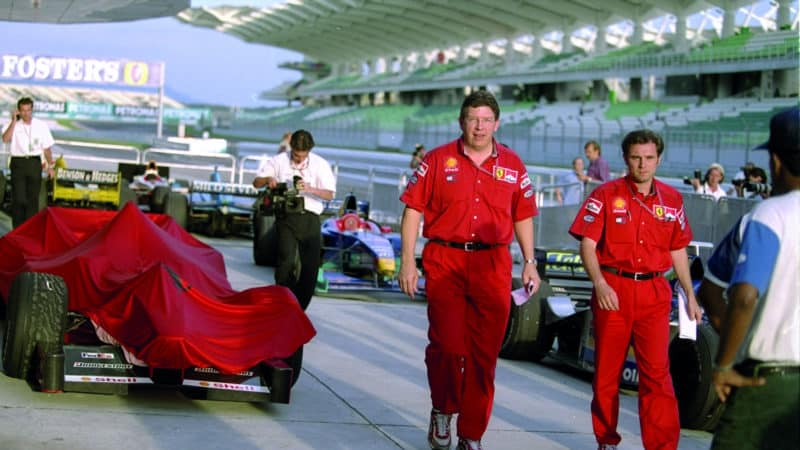
Alongside Ross Brawn at Ferrari in 1999. The pair now form the backbone of Formula One Management
Getty Images
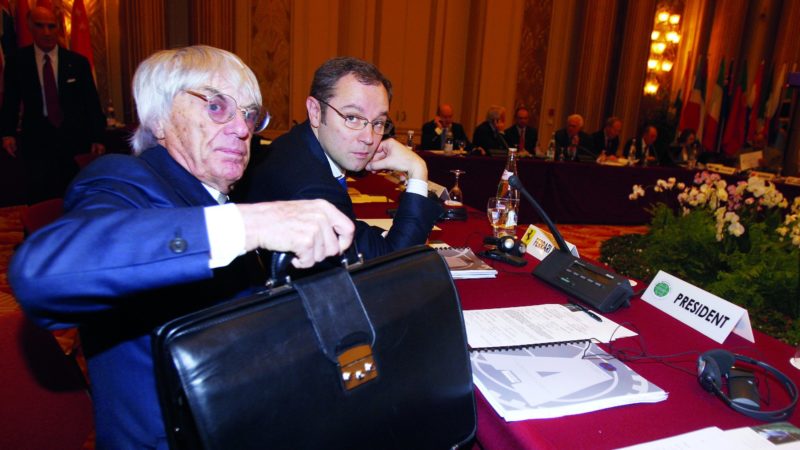
In conference with Bernie Ecclestone – Domenicali is only the third man to run the sport
Getty Images
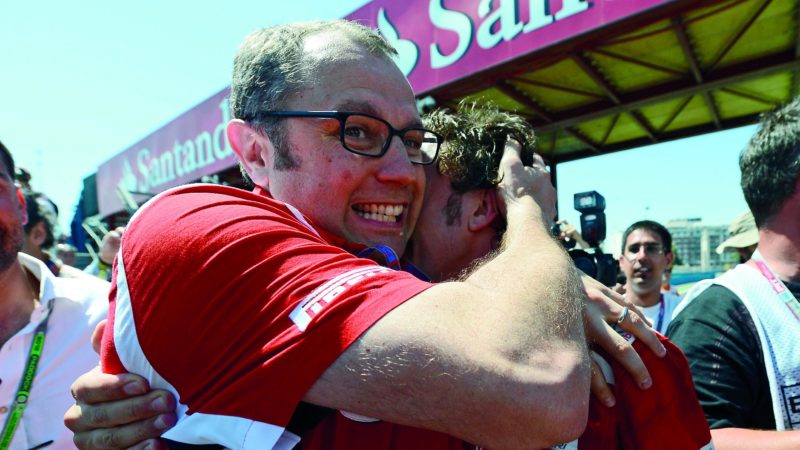
Celebrating a win at Valencia with Fernando Alonso in 2012
DPPI
“These are memories that will never get out of my mind. But it’s part of the history of racing, it’s part of the emotion of racing. It is very frustrating when you lose a championship for one or two points, but it gives you an incredible spirit to never give up. And in any case, we were there as a group. And when you are there to fight, it’s something unique.”
“Technology is relevant, but fans come to see drivers fighting”
By the start of the hybrid era Ferrari had not won a drivers’ title in six seasons, and those three near misses were to prove costly for Domenicali. Pressure from Fiat boss Sergio Marchionne was building.
When the team’s new V6 power unit proved to be hopelessly uncompetitive Luca di Montezemolo had to find a scapegoat. Domenicali departed early in 2014 – it was heartbreaking for a man so steeped in Ferrari.
“It was a very difficult moment, sure. But I felt in that moment, for many reasons, it was right for me to say, ‘Listen guys, I take the responsibility, I withdraw myself.’ And, you know, for a guy like me that had the heart of Ferrari for 23 years, it was really difficult.
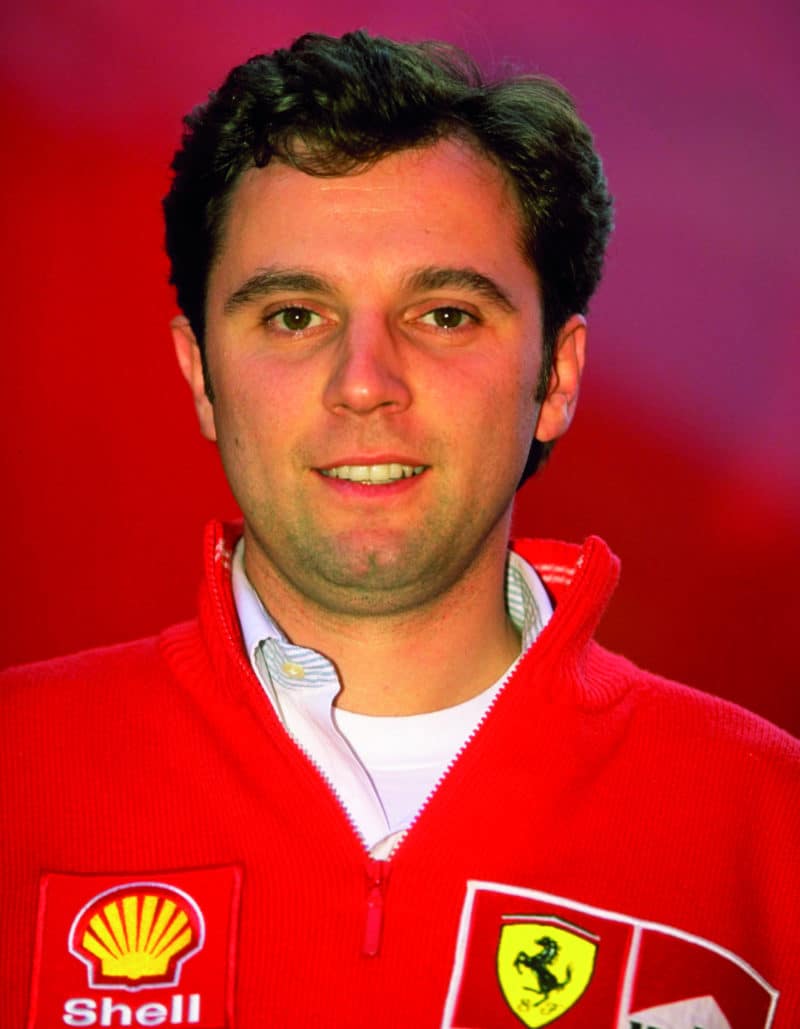
Fresh-faced during his early Ferrari days
Getty Images
“I thought, and I’m still thinking, that I did the right thing. There were so many things going on that it was better to keep it like that. And I do believe that despite the situation, as always in life, there is a door that is closing, there is a bigger door that will open later, let me put it this way.”
Domenicali took little comfort from the fact that his hapless replacement Marco Mattiacci –a road car marketing man – proved to be out of his depth.
Todt, by now president of the FIA, offered him a role as the head of the Single-Seater Commission, tasked with consolidating the jumbled career ladder to the top. It provided Domenicali with more useful experience, and furthered his inside knowledge of the governing body.
However that was just a part-time job that he fitted around a new challenge with Audi, which he commenced in October 2014.
“I needed to have a break of a couple of months because really the pressure was very, very high, as you can imagine, in Italy with Ferrari and so on. I was open for any kind of opportunity, and I have to be thankful to Audi Group, and to [CEO] Rupert Stadler. He was the first to call me personally, directly, the day after my resignation. I received other offers, but after six months I said, ‘Okay, I will come.’”
Named vice-president of new business initiatives, his main job was to conduct a feasibility study for an Audi entry into F1. Alas the timing was wrong: “During that period if you remember ‘Dieselgate’ came out, and all the things that were not really core business didn’t have the chance to move on.”
Early in 2016 Domenicali moved sideways to become CEO of Lamborghini. Once again he widened his knowledge, and usefully for his current F1 job some of the most important lessons came in the world of social media.
“We needed to change the brand perception. And the young generation talk or communicate through a different way and using different tools. So I learned a lot how to maximise that.”
Domenicali looked well set at Lamborghini when the chance to lead the F1 organisation emerged: “I was not expecting it, and I have to be thankful to Chase Carey and to [Liberty Media CEO] Greg Maffei, because they asked me to have a meeting to discuss F1, as a very generic point, just to have a few words.
“And then eventually, it was last year in the week of Monza, that basically they said to me, ‘We would like to discuss with you the future.’ And my mindset was not ready for that, I was not expecting that.
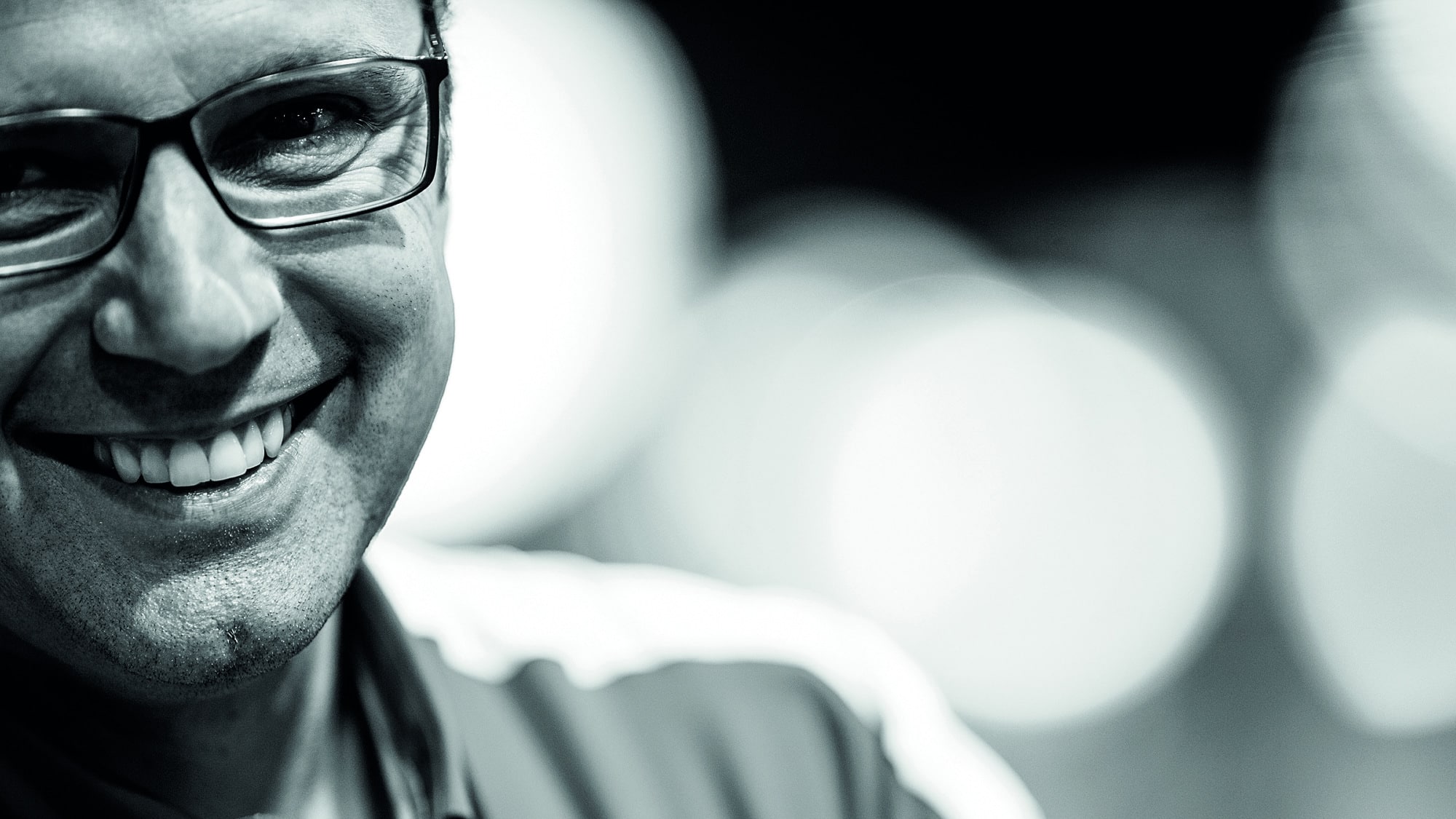
“There was, I would say, a positive shock moment where I needed to share that with my family, because there had been a period where I found the right balance with my kids and with my wife. And of course with this job we had to move to London.”
So why leave Lamborghini and Italy to take up the F1 role? “The appeal is very simple. In life, there are things that are apart from the business perspective. I was born in the racing context, and when we are talking about F1, for me F1 has been from the emotional side something unique and incredible.
“If you think about F1, in that role there were only two people that managed it. There was Bernie, who created it, and then Chase that was able to take F1 at that moment in a different situation. And then to be there, and to believe that I can do that, to cover that position, there are not so many chances. So I took it, as an incredible responsibility but an incredible opportunity to try to do what I feel is right for this sport, for this business. Because that’s the way that I’m always doing things when I’m doing something. I want to dedicate myself 100% to make sure that we maximise what we are having.”
Carey had completely rebuilt the F1 organisation, signed the new Concorde Agreement, helped the FIA to push the budget cap through, and steered the sport through the first year of Covid. Working alongside his former Ferrari colleague Ross Brawn, Domenicali’s task is to take the sport to the next level, bring in more fans, find new venues.
“We have so many big challenges for the future, to make sure that the sport will involve more and more people, and will be sustainable for the business and for the teams.
“We need to make sure that our avid fans will stay, but also that new partners and new fans can be attracted. I would say the major thing is to grow the popularity of F1. By doing that, the other things will be the tools, how to activate and the connectivity that will grow with fans around the world.”
Liberty boss Maffei made it clear recently that one of Domenicali’s key tasks is to attract new manufacturers to F1, and specifically his old pals at VW/Audi. The first step is to finalise the new power unit rules for 2025.
“I think what is important is to create the conditions to be attractive for any possible newcomers. We are solid now with the actual OEMs that really invested in our sport.
“But we cannot be complacent on who we are in the future. We need to create the right conditions for any others, that could even be an independent, that can be part of the business. It will give us once again tools of credibility for the future.”
And what about new teams? Domenicali stresses that the main priority is to keep the existing competitors alive.
“I can tell you that after the introduction of the budget cap we are receiving a lot of requests, but I do believe that it’s important to keep the value of the actual franchises or teams, because that really can make the difference in terms of their sustainability. I would prefer to keep a better sustainability with the teams that are actually here.”
The calendar remains a major issue, and expanding it will not be easy in a Covid world. The Vietnam project has collapsed, but Saudi Arabia joins this year, and after several false starts, a Miami GP is finally on the horizon.
“I would think we’ve never had so many requests from around the world. It’s a matter of balancing new strategic positions in terms of where we are going into the future.
“I don’t think that we can grow more than the number of races we have today. But you will see in the next couple of years we’re going to add some other venues. We need to balance the presence in Europe, because we need to be a true World Championship.”
The good news for fans is that the classic European venues are safe. Domenicali has never forgotten his roots, cheering on the likes of Gilles Villeneuve alongside the rest of the tifosi at Imola. “Technology is absolutely relevant. But we don’t have to forget that people are coming here to see drivers fighting, and to create this kind of emotion around that. And together with the FIA, we need to keep that at the centre of our agenda. We don’t have to forget who we are, and what we’re doing.”
